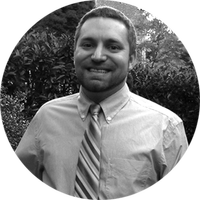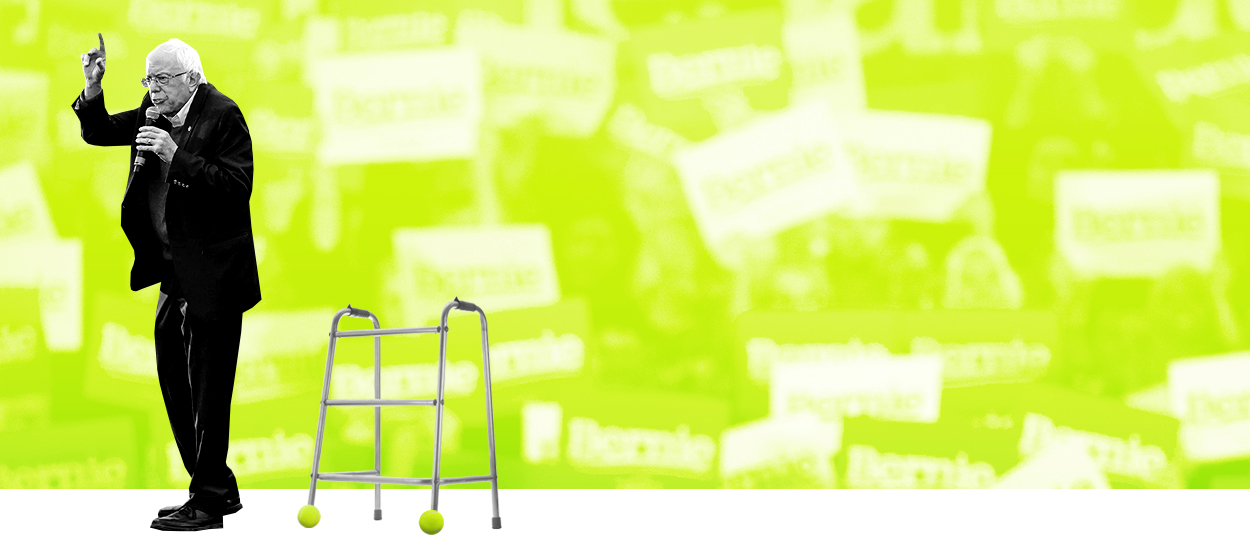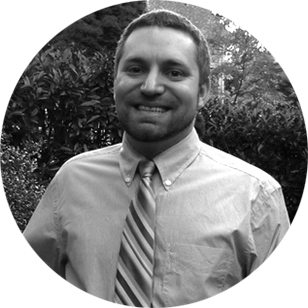The feeble rise of the elderly candidate
This is bad for our politics


A free daily email with the biggest news stories of the day – and the best features from TheWeek.com
You are now subscribed
Your newsletter sign-up was successful
If the 22nd Amendment didn't exist and 73-year-old Bill Clinton had improbably joined the Democratic primaries before the Nevada caucuses, he would have been the second youngest man on the Feb. 19 debate stage after 38-year-old Pete Buttigieg, a viral tweet recently informed us. (This was before 62-year-old Tom Steyer qualified for the South Carolina debate.) Hammering the point home, 77-year-old former Vice President Joe Biden observed afterwards that he was the second youngest man on stage in Las Vegas.
All of which is to say that the Democratic finalists are really old by historical standards. The frontrunner, in fact, is the oldest: 78-year-old Sen. Bernie Sanders, who suffered a heart attack on the campaign trail. And the winner of the primary will face Donald Trump, already the oldest man ever sworn into a first term as president. While supporters of each candidate dismiss questions about their fitness and age as ageism or applicable to others but not their chosen candidate, the parade of older candidates is bad for our politics.
Times have certainly changed. In 1980, the 69-year-old Ronald Reagan became the oldest president ever elected. Reagan's age was an issue — he pledged to resign if there were signs that his "capabilities had been reduced." Fueling questions was the reality that the average life expectancy for a 65-year-old white male at the time was 14.2 years.
The Week
Escape your echo chamber. Get the facts behind the news, plus analysis from multiple perspectives.

Sign up for The Week's Free Newsletters
From our morning news briefing to a weekly Good News Newsletter, get the best of The Week delivered directly to your inbox.
From our morning news briefing to a weekly Good News Newsletter, get the best of The Week delivered directly to your inbox.
The age question resurfaced after Reagan uncorked a woeful performance in his first face-off against former Vice President Walter Mondale in 1984. Reagan famously defused doubts with a zinger in their second debate, pledging "I will not make age an issue of this campaign. I am not going to exploit, for political purposes, my opponent's youth and inexperience."
Nonetheless, some believe that Reagan was cognitively less sharp and engaged in his second term, although claims that he already had Alzheimer's symptoms have never been proven.
Between 1988 and 2016, Republicans ran two candidates over 70 — the 73-year-old Bob Dole and the 72-year-old John McCain — and Democrats none. There were questions about Dole's age and fitness, exacerbated when he fell at a campaign rally. Roughly a third of poll respondents believed that Dole was too old or that his age was an "obstacle to being an effective president;" he even fielded a debate question about it.
Twelve years later, McCain calmed fears about his age by publicly releasing almost 1,200 pages of medical records. But both Dole and McCain lost to far younger nominees.
A free daily email with the biggest news stories of the day – and the best features from TheWeek.com
Yet, whatever barrier advanced age once posed to getting elected president has evaporated over the last four years. Trump's age may not have posed an obstacle in 2016 because his opponent, Hillary Clinton had herself turned 69 on the eve of the election (and she was the younger of the two major Democratic contenders). But this year, with a Democratic field full of accomplished younger officeholders, four of the seven legitimate remaining contenders are 70 or older: the 70-year-old Sen. Elizabeth Warren, Biden, Sanders, and 78-year-old former New York Mayor Michael Bloomberg.
In fairness to the candidates, life expectancy has risen since Reagan's presidency, reaching 18.1 years for 65 year old men and 20.7 for women — meaning an average lifespan would carry all of the contenders through a first term, albeit just barely for Sanders. But that doesn't guarantee fitness to do a grueling job that seems to age all of its occupants. And there are downsides to older candidates outside of questions about their capacity.
First, their familiarity from years in the spotlight and connections forged from decades of cultivating activists and donors give older candidates significant built-in advantages. That means they draw a lion share of attention from the media, which focuses on a relatively narrow band of candidates at any given moment. This makes it hard for younger contenders to gain attention.
As Democratic strategist James Carville recently noted, Biden occupied the oxygen and attention in the "mainstream" lane of the primary, making it impossible for candidates like Sens. Cory Booker and Michael Bennet, and Montana Gov. Steve Bullock to gain traction and raise money. This reality kept voters from ever really getting exposed to unique candidates with fresh ideas and perspectives. As veteran reporter Andrea Mitchell lamented about Bennet's candidacy, "This was one of the most thoughtful candidates to run for president — and not get an adequate hearing. Maybe next time."
Second, the long records of older candidates have become fodder in the campaign — frequently judged by 2020 standards with little regard for historical context. Instead of leading to fruitful debates on candidates' visions or their plans to deliver, Biden's decades-old record on school busing or Sanders' 1980s comments on authoritarian socialist regimes have stolen headlines. At a moment when our focus needs to be on the future, long records keep it trapped on the past.
Finally, our world is changing at dramatic speeds. Even people in their 30s and 40s can find technological innovations (especially proliferating social media platforms) disorienting. Technology and changes in cultural norms have dramatically remade every realm of American life and the demands facing everyone from professionals to young families to workers losing jobs (or who will lose jobs) to automation — something raised during the primary by 45-year-old Andrew Yang. How many people under 50 have struggled to explain to elders why the demands of their jobs are more relentless because of the rise of smart phones, which keep them tethered to work 24/7? Or why their generations move from job to job more far more frequently? Let alone millennials' preference for text messaging over phone calls or even email, the rise of meal services, how to guard against phishing schemes, or there being more than two genders.
Fundamentally, younger candidates have a better grasp of the needs of millennials (and generations X and Z) because they've more fully inhabited this new, ever changing world. This enables them to offer more creative solutions — with a better shot of bridging ideological divides — to many of our problems.
Which is not to say that older Americans don't have good ideas, or can't contribute to our politics. Experience is valuable; one can argue that Buttigieg, for example, could've used more seasoning before running for president. But when you add all of these factors together, we'd be better off if candidates in their upper 70s stepped aside and let younger generations of leaders, better suited to the intense demands of the presidency, pick up the baton.
Want more essential commentary and analysis like this delivered straight to your inbox? Sign up for The Week's "Today's best articles" newsletter here.
Brian Rosenwald is a Resident Senior Fellow at the Robert A. Fox Leadership Program at the University of Pennsylvania, co-editor of Made by History at the Washington Post, and author of Talk Radio's America, forthcoming from Harvard University Press in 2019.
-
 6 exquisite homes with vast acreage
6 exquisite homes with vast acreageFeature Featuring an off-the-grid contemporary home in New Mexico and lakefront farmhouse in Massachusetts
-
 Film reviews: ‘Wuthering Heights,’ ‘Good Luck, Have Fun, Don’t Die,’ and ‘Sirat’
Film reviews: ‘Wuthering Heights,’ ‘Good Luck, Have Fun, Don’t Die,’ and ‘Sirat’Feature An inconvenient love torments a would-be couple, a gonzo time traveler seeks to save humanity from AI, and a father’s desperate search goes deeply sideways
-
 Political cartoons for February 16
Political cartoons for February 16Cartoons Monday’s political cartoons include President's Day, a valentine from the Epstein files, and more
-
 The billionaires’ wealth tax: a catastrophe for California?
The billionaires’ wealth tax: a catastrophe for California?Talking Point Peter Thiel and Larry Page preparing to change state residency
-
 Bari Weiss’ ‘60 Minutes’ scandal is about more than one report
Bari Weiss’ ‘60 Minutes’ scandal is about more than one reportIN THE SPOTLIGHT By blocking an approved segment on a controversial prison holding US deportees in El Salvador, the editor-in-chief of CBS News has become the main story
-
 Has Zohran Mamdani shown the Democrats how to win again?
Has Zohran Mamdani shown the Democrats how to win again?Today’s Big Question New York City mayoral election touted as victory for left-wing populists but moderate centrist wins elsewhere present more complex path for Democratic Party
-
 Millions turn out for anti-Trump ‘No Kings’ rallies
Millions turn out for anti-Trump ‘No Kings’ ralliesSpeed Read An estimated 7 million people participated, 2 million more than at the first ‘No Kings’ protest in June
-
 Ghislaine Maxwell: angling for a Trump pardon
Ghislaine Maxwell: angling for a Trump pardonTalking Point Convicted sex trafficker's testimony could shed new light on president's links to Jeffrey Epstein
-
 The last words and final moments of 40 presidents
The last words and final moments of 40 presidentsThe Explainer Some are eloquent quotes worthy of the holders of the highest office in the nation, and others... aren't
-
 The JFK files: the truth at last?
The JFK files: the truth at last?In The Spotlight More than 64,000 previously classified documents relating the 1963 assassination of John F. Kennedy have been released by the Trump administration
-
 'Seriously, not literally': how should the world take Donald Trump?
'Seriously, not literally': how should the world take Donald Trump?Today's big question White House rhetoric and reality look likely to become increasingly blurred
